STOCK THEFT
Sheep rustlers driving Free State farmers out of business — and police seem indifferent
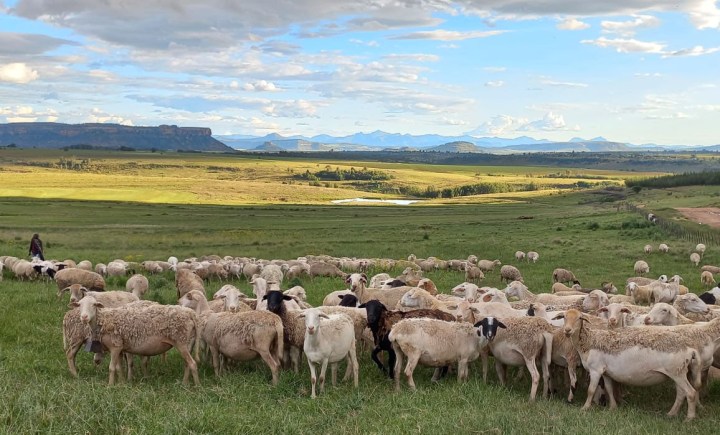
Established farmers in the Free State are selling their sheep by the thousands because stock theft syndicates are making it impossible for them to continue doing business.
While stock theft, especially across the border between South Africa and Lesotho, has been a problem for well over a decade, it is now so rife that it is said to be threatening the agricultural sector and the country’s food security.
Daily Maverick has heard from several angry eastern Free State farmers who are especially vocal about their suspicions that certain police members are involved in the syndicates’ operations – and that authorities are not doing enough to get to the bottom of it.
Henton Minnaar, sheep and wool adviser at agri-business BKB, says that right now in the Brandfort district alone, 14,000 ewes are for sale. Much of this can be attributed to the increase in stock theft, leading to sheep farmers closing up shop.
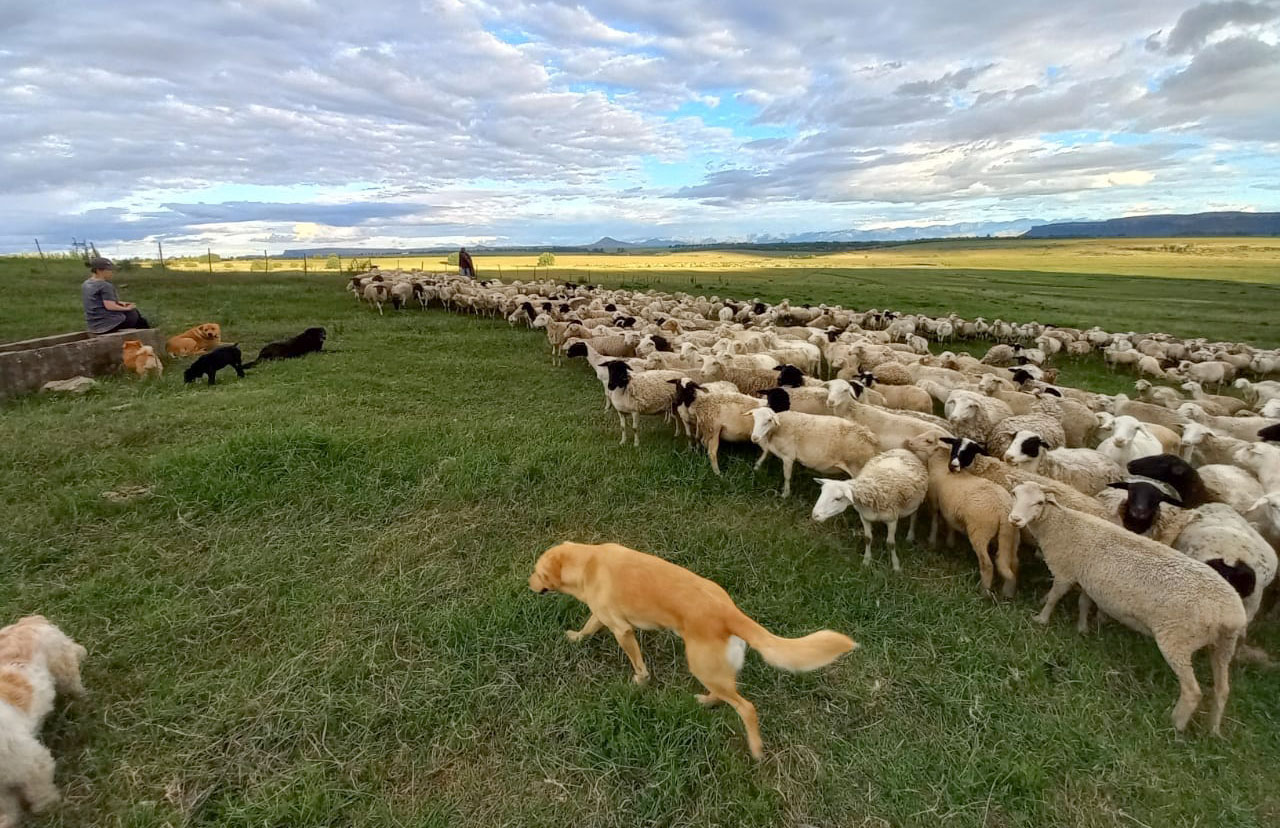
Morgan Barrett’s farm Boschfontein in Ficksburg, next to the Lesotho border. (Photo: Supplied by Morgan Barrett)
“We’re very worried. Losing the three to six kilograms of wool each sheep provides, threatens our entire agricultural business,” said Minnaar.
‘Organised crime syndicate’
The Ficksburg community has over the past few years been growing increasingly agitated over the truckloads of sheep and cattle regularly seen being transported in the area – either to or from Lesotho across the Caledon river, as well as to auctions in nearby towns and even Gauteng. The trucks move over weekends and at odd hours of the night.
Owing to the large number of animals being stolen and the sophisticated level of criminal activity taking place in recent years, farmers and various agricultural bodies are convinced that this is the work of a well-oiled, organised crime syndicate orchestrating the theft, transport and speculating of cattle.
Jane Buys, safety and risk analyst at Free State Agriculture, says it is crucial that police and the National Prosecuting Authority regard this as “organised crime” to ensure it receives adequate attention.
Police spokesperson Col Athlenda Mathe commented that “although stock theft might be organised in certain instances, it cannot be said that it is organised in general.
“The Division: Detective and Forensic Services established an Organised Crime Investigation capacity within all provinces to investigate all organised crime, including stock theft in cases where investigations indicate that it is of an organised nature.”
Jess de Klerk from agri-organisation Saai, describes stock theft as an intricate business with a lot of money changing hands.
R8m worth of stock stolen in January
“If you look at the number of cattle that get stolen, it’s too enormous just to disappear. In January alone, R8-million rands’ worth of livestock was stolen in the Free State. I dare say, by the end of the year we’ll have reached between R80 and R100-million. This means there’s a lot of money available for bribery.”
Friedl von Maltitz, vice-president of Free State Agriculture, who also farms in Ficksburg, is saddened by the “difficult and sensitive situation” their community finds itself in.
“Every day we see each other at the koöperasie (co-op). Yet so many people around us are being sucked into these syndicates and their activities because there is so much lucrative money involved.”
For the past decade, stock theft has been an especially grave concern in the area. As far back as 2011, the National Rural Safety Strategy (NRSS) was launched “to address rural safety as an integrated day-to-day policing approach by creating a safe and secure rural environment, making provision for the increase of organised crime threat analysis in rural areas to address organised crime”.
Police task team
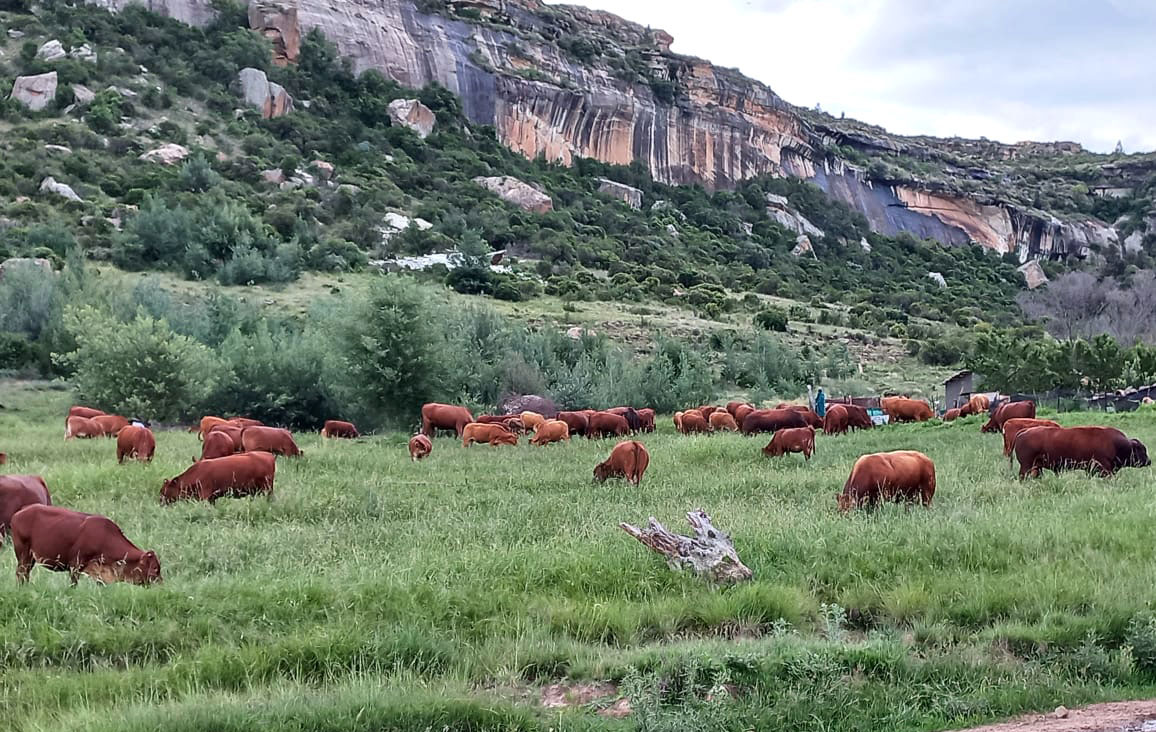
Owing to a large number of animals being stolen and the sophisticated level of criminal activity taking place in recent years, farmers and various agricultural bodies are convinced that this is the work of a well-oiled, organised crime syndicate orchestrating the theft, transport and speculation in cattle. (Photo: Supplied by Morgan Barrett)
In 2020, Police Minister Bheki Cele appointed a task team to investigate stock theft in the Free State after 21-year-old farm manager Brendin Horner was murdered in Paul Roux in October of that year.
Cele spoke to the farming community, giving farmers an opportunity to hand him their own dossier filled with allegations of stock theft syndicates operating in the area. It also contained allegations that police were involved and included specific names.
Two years later, at the Rural Safety Summit in Parys in June last year, national police commissioner General Fannie Masemola admitted to stock theft being a problem.
He declared that in the 11 years since the NRSS was launched, Stock Theft Units (STU) had not been adequately tackling the task at hand. The NRSS and STUs needed to be refined and improved, he said.
A 15-member national working committee was then established to ensure safer rural and farming communities, said Mathe. The team consists of representatives from organised agriculture, business, academic institutions, traditional leaders, research institutions, the National Police Consultative Forum, labour unions and faith-based organisations.
“The team identified six to nine rural safety priorities that needed to be addressed in a multi-disciplinary approach as requested by the Minister of Police. This team is part of the existing integrated Priority Committees for Rural Safety that exists on all levels (national, provincial and ground level) to coordinate matters of rural safety.
“All role players in the rural and farming community, departmental and civil society, are involved in the committees (this includes the South African National Defence Force, organised agriculture, the Departments of Agriculture, Rural Development and Land Reform, Traditional Affairs and the SA Police Service).
“The established team will assist and support these committees with the implementation of the Rural Safety Strategy and identified key priorities.”
Little success
Jane Buys points out, “When the NRSS was implemented in 2011, police identified 40 clusters countrywide where stock theft was a high-priority crime. Back then, we had 14 towns in the Free State where stock theft was a serious problem. Ficksburg was one of those towns. Now, 11 years later, 10 of the 14 are still high stock theft crime areas. Why is that?”
According to the safety representative in the area, an average of 500-800 cattle per month are now being stolen in the district of Ficksburg.
Buys shared the past 10 year’s police statistics showing that eight of the 13 Free State towns along the Lesotho border have seen an increase in stock theft in the past five years compared with the previous five.
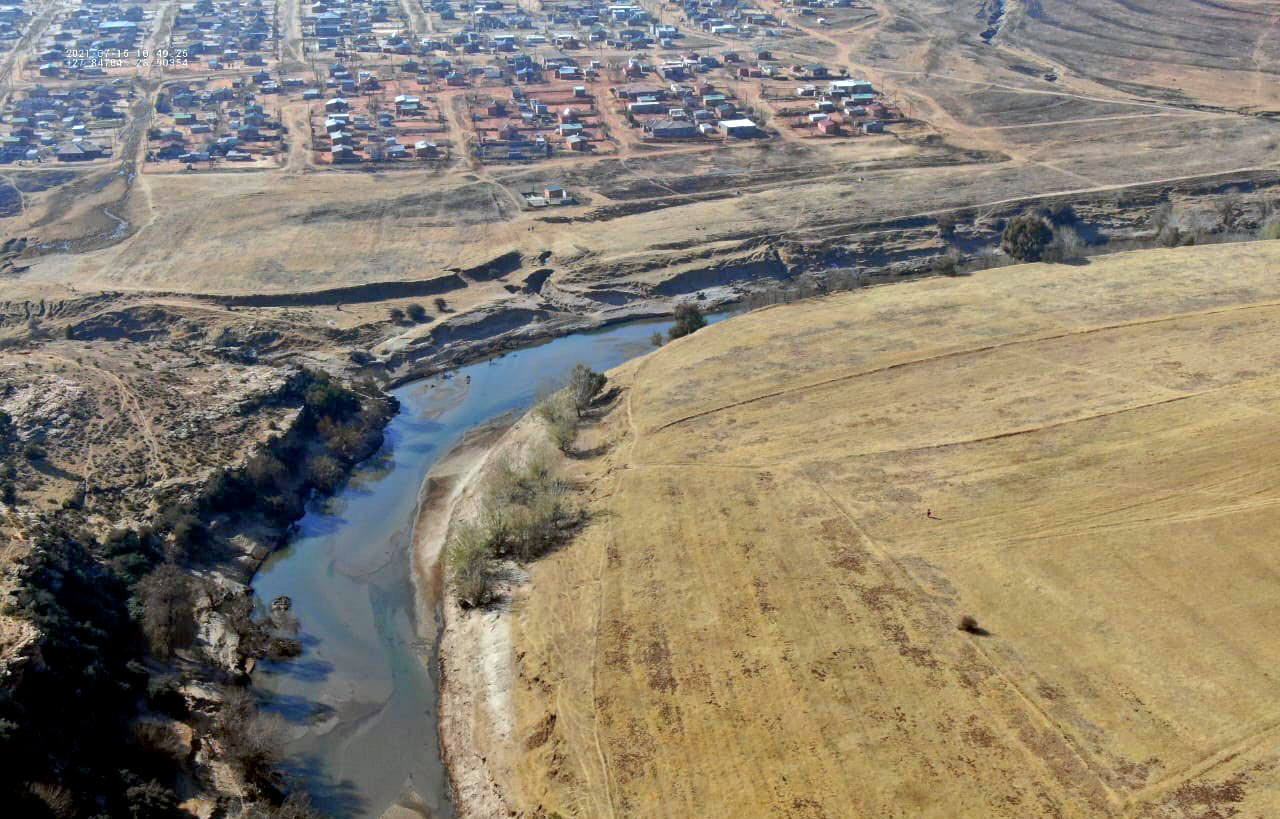
Aerial drone shots depicting the Caledon River between the Eastern Free State and Lesotho, provided by private investigators in the area. It shows the border and where cattle often cross during theft operations. (Photo: Supplied)
“Over the last 10 years, these border towns represent 21.74% of the over 37,000 stock theft cases that were reported in the entire Free State.”
Buys, who worked for the police for 14 years, emphasises that for a case to be recorded as “reported” and be part of the national crime statistics, a docket had to be successfully opened.
“In this province we have a huge problem in terms of the reporting of stock theft and other crimes, by the police themselves. The amount of stock theft dockets successfully opened doesn’t come close to several districts’ own stock theft statistics and experience on the ground. So many stock theft cases simply go ‘unreported’. Why, we do not know.”
STU members implicated
Von Maltitz highlighted the fact that in July 2021, five members of the Ladybrand STU were arrested for stock theft. They were dismissed, yet their trial has still not run its course. Their posts were also never filled again, weakening the unit substantially.
Following farmer Evan Sorour’s murder last month, another task team has been established in Ficksburg to support the Ladybrand STU, said police spokesperson Sergeant Mmako Mophiring. Sorour was allegedly murdered by a neighbouring farmer while rounding up cattle that had escaped from his farm.
Scarcely a month ago, another policeman, warrant officer Moropisi Phukuntsi, the acting station commander in Paul Roux, appeared in court on charges of stock theft.
According to Mathe, the SAPS “deals with all corrupt police officials in a serious manner in accordance with the prescribed processes and systems in place within the organisation”.
Von Malitz remarked, “The stock theft market in this area is now so lucrative and generates such huge profits.”
“We suspect many police get pulled into these crime syndicates because of the large amounts of money involved. Imagine being paid thousands of rands just to stay quiet or not stop a truck on the road… It is a huge problem.”
Dangers
It might even have become too dangerous to do efficient policing related to stock theft crimes, he says.
“You get threatened if you don’t dance to the syndicates’ tunes. STU posts that are vacant, most likely don’t get filled because some police are simply too scared.”
Tragically, towards the end of January this year, Sergeant John Lechachela Dikgoele, part of the police’s stock theft unit in Bloemfontein, was shot dead in his home.
When Daily Maverick asked the Hawks whether these allegations of police corruption were being investigated, Brigadier Thandi Mbambo, national spokesperson for this priority crime investigation unit, said at present they are not investigating any alleged police corruption related to stock theft cases in Ficksburg or anywhere else in the Free State, for that matter.
Visit Daily Maverick’s home page for more news, analysis and investigations
Sadly, extensive damage has been done to South Africa’s sheep farming industry, with many successful farmers who have been farming on historic family land now selling their sheep to protect their businesses – and their families’ lives.
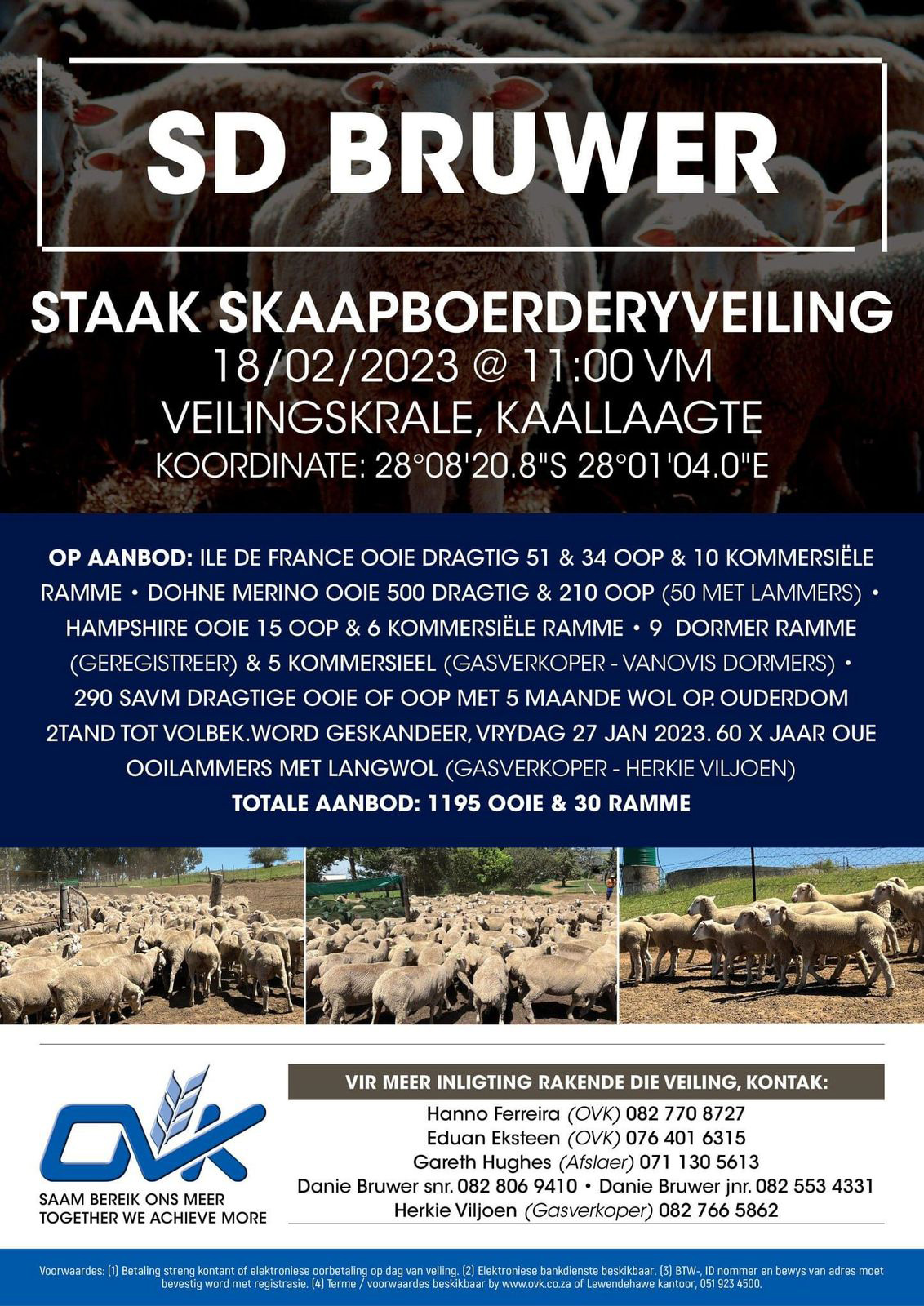
Advertisement of Danie Bruwer’s upcoming ‘cease farming auction’.
Danie Bruwer, a farmer from Paul Roux, had 300 of his sheep stolen last year. He is now selling over a thousand ewes and 30 rams at a “cease farming auction” this month.
“Yes, I’m officially stopping my sheep farming business. And yes, it’s because of stock theft. Sheep are simply too easy to steal.”
Hanno Ferreira, also farming in Ficksburg and a livestock marketer for the OVK Group, says to put Bruwer’s situation into perspective, the 76 ewes Bruwer recently lost to stock theft in a month is equivalent to losing almost 100 lambs, which amounts to R150,000 in lost income – and that’s disregarding the ewes’ worth. For a farmer with 1,000 or 2,000 ewes, that’s a serious problem.
He’s worried. “It’s food security that’s threatened, yes. In the long term, I am expecting a shortage of lamb and mutton meat in the market. But the decline in ewes’ wool will also impact the producers of wool.
Job losses
“This then leads directly to job losses for many people in the area, including farm workers. It pulls through to their homes and families too. It is altogether very bad for any district if even just a handful of people suddenly sell their sheep.”
Herkie Viljoen, an outspoken figure who farms between Paul Roux and Bethlehem, is also selling his last 350 sheep at Bruwer’s auction.
“Over the course of three years, I’ve lost more than 100 sheep. But there have been no arrests.”
He’s not afraid to talk frankly anymore. He jokingly says he’s sure by now he has a target on his back.
“I’ve lost my fear long ago. Sheep farming is one of my passions… this land has been in my family for 120 years. But it’s not worth the frustration any more. We’re at boiling point.” DM/OBP





















Comments - Please login in order to comment.